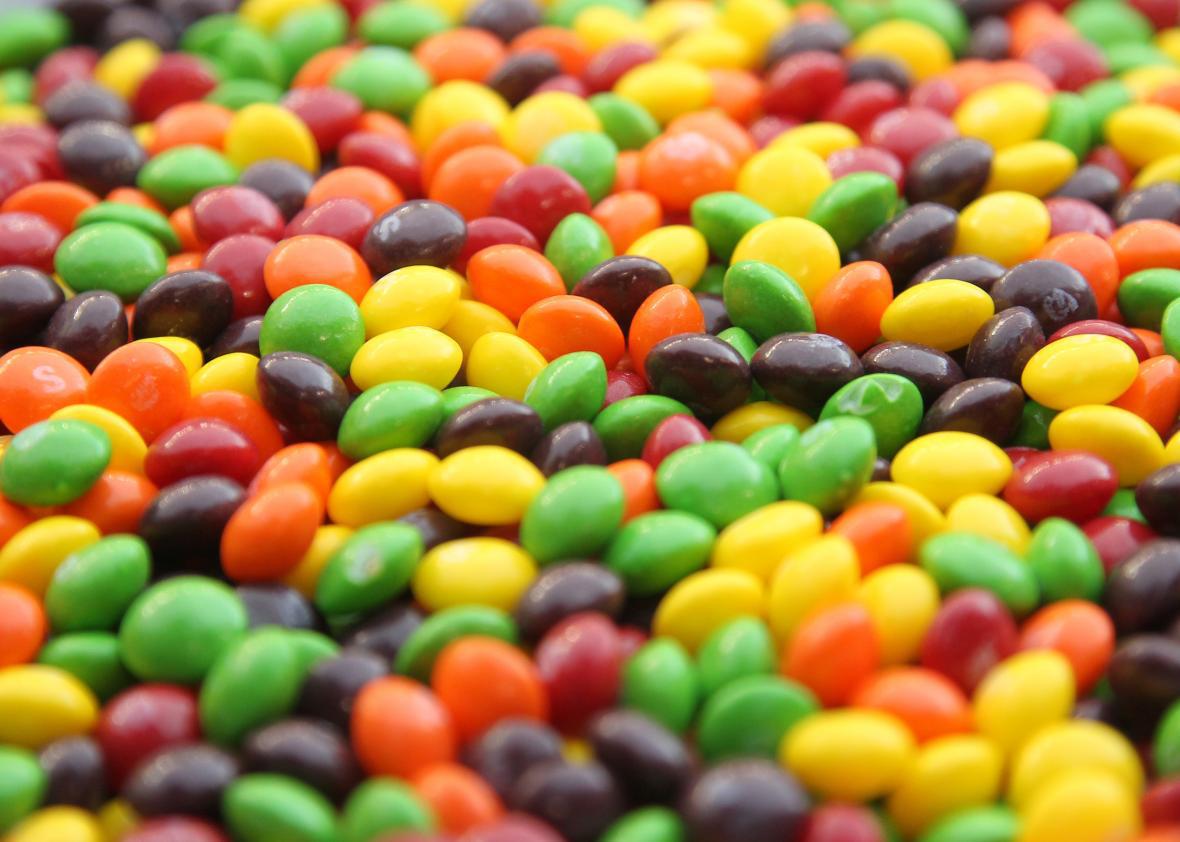Last week, Fox sports reporter Emily Austen received an official reprimand for her “insensitive and derogatory” remarks during a live Facebook video. “I didn’t even know Mexicans were that smart,” Austen had marveled, reflecting on the undocumented Texas student who earned a full ride to the University of Texas at Austin. Then Austen issued the following disclaimer from her colorblind heart: “I don’t care if you’re white, yellow, brown, purple.”
It was the taunt about Mexicans that drew down Fox’s censure, but Austen (pale beige) was also participating in a tried-and-true tradition: The invoking of bizarrely hued people to demonstrate her tolerance. Rhetorical human Skittles are so widespread that comic Mitch Hedberg mocked them in a 2002 stand-up routine: “You know how when it comes to racism, people say: ‘I don’t care if they’re black, white, purple or green’? Hold on now—purple or green? You gotta draw the line somewhere! To hell with purple people! Unless they’re suffocating—then help ’em.”
The joke is funny, see, because well-oxygenated violet humans do not exist. Green humans do not exist. Yellow with polka dots on your head humans do not exist. When writers scroll through the rainbow in pursuit of ever more outlandish skin tones to assign to their hypothetical fellow man, they almost always end up equating minorities with aliens.
Are they not also equating white folks with aliens? In theory, sure, but in practice the trope is most likely to snap into place when someone (usually white) wants to dismiss or pre-empt a charge of racism—or worse, justify their liking for a person of color. Take the earliest instance of prismatic person-listing I could find, courtesy of Anna on Twitter. In this letter about the actor Sidney Poitier, from a 1968 edition of Ebony magazine, a Texas-dwelling fan avers: “To me, he’s clean-cut, decent and sexy. He is my favorite screen star, and I don’t care if Sidney is black, white, or purple.” Or consider another dispatch that appeared in a 1992 issue of the Atlanta Journal-Constitution, in which a reader responded to an op-ed about a white woman fleeing an innocent black man: “I believe the letter writer was talking about me … I did not care that he was black, white, or purple. As long as women continue to be raped, as long as people continue to be robbed in parking lots, malls and automatic teller machines [sic], and as long as I feel unsafe, I’ll continue to run. No hard feelings.”
But how to avoid hard feelings when you’re also implying that dark skin is an unsightly detail, a flaw you’re willing to politely overlook? The site “stuff white people do” excavates an Internet comment about Barack Obama: “I don’t care if he’s black, white, yellow, red, brown, or purple with green spots. Everyone just be grateful and stop worrying about what color he is.” The blog then points out: “That’s pretty close to saying everyone should just ignore what color he is. … And why should they? Is [being black] so terrible?”
Noted paragon of sensitivity Eminem jumped on the skin-tones-that-don’t-exist-in-nature bandwagon, rapping, “now whether you’re black, white, or purple/ if you’re misunderstood … long as you know you’re up to evil/ and you’re no damn good…”
Confession time: I have partaken in this weirdly hued person trend. Once upon a time, I tried to establish a Hammurabi’s Code of poetry reviewing.
If you are a person, you can say your opinions about any person’s poetry. Straight white men can say things about straight white women’s poetry. Black gay men can say things about Asian transgender poetry. Women who turn into polyamorous donkeys on the stroke of midnight can say things about the poetry of little green fellows whose sexual fetishes lie beyond the scope of this analogy.
Later, I begged college students to read the English canon, despite its racist and sexist overtones.
The “stay in your lane” mentality that seems to undergird so much progressive discourse—only polyamorous green people really “get” the “polyamorous green experience,” and therefore only polyamorous greens should read and write about polyamorous greens, say—ignores our common humanity.
Let’s leave to the therapists my dubious reliance on polyamory as a diversity signifier. (I’m sorry, polyamorists!) I wanted these passages to express, through hyperbolic humor, the irrelevance of race, gender, and sexual orientation as they pertain to reading literature. And I wanted to hint at the dizzying variety and specificity of the identities we can claim for ourselves by positing even more categories, even more shades. But race, gender, and sexual orientation aren’t irrelevant. My words reduced the reality of racial difference to a joke. Asian transgender poets endure actual hardships; were-donkeys do not. Like replying to a reminder that “black lives matter” with the cry that “all lives matter,” conjuring imaginary green people erases the facts on the ground for minorities—it allows pseudo-creative frippery to elide the real privilege of being white.
Color me ashamed.
(Also, referring to people as “black,” “white,” “brown,” “red,” or “yellow” evokes the “five color typology” of Johann Friedrich Blumenbach, a 19th-century anthropologist who divided humankind into a quintet of races: white/Caucasian, black/Ethiopian, yellow/Mongolian, cinnamon- or flame-colored/American, and brown/Malaysian. Do we really want his legacy hovering over our expressions of tolerance?)
Perhaps the worst part, though, is when these words are placed in the mouths of people of color. In Remember the Titans, Denzel Washington’s character begins the difficult process of integrating his football team: “Listen up, I don’t care if you’re black, green, blue, white, or orange, I want all of my defensive players on this side, all players going out for offense over here.” There’s something lovely and seductive about the belief that, in 1971 Virginia, black equals green equals blue equals white. But naïve rhetoric aside, a good coach in a Nixon-era American high school would care about the racial background of his players; he’d have to. Especially if he were black.
